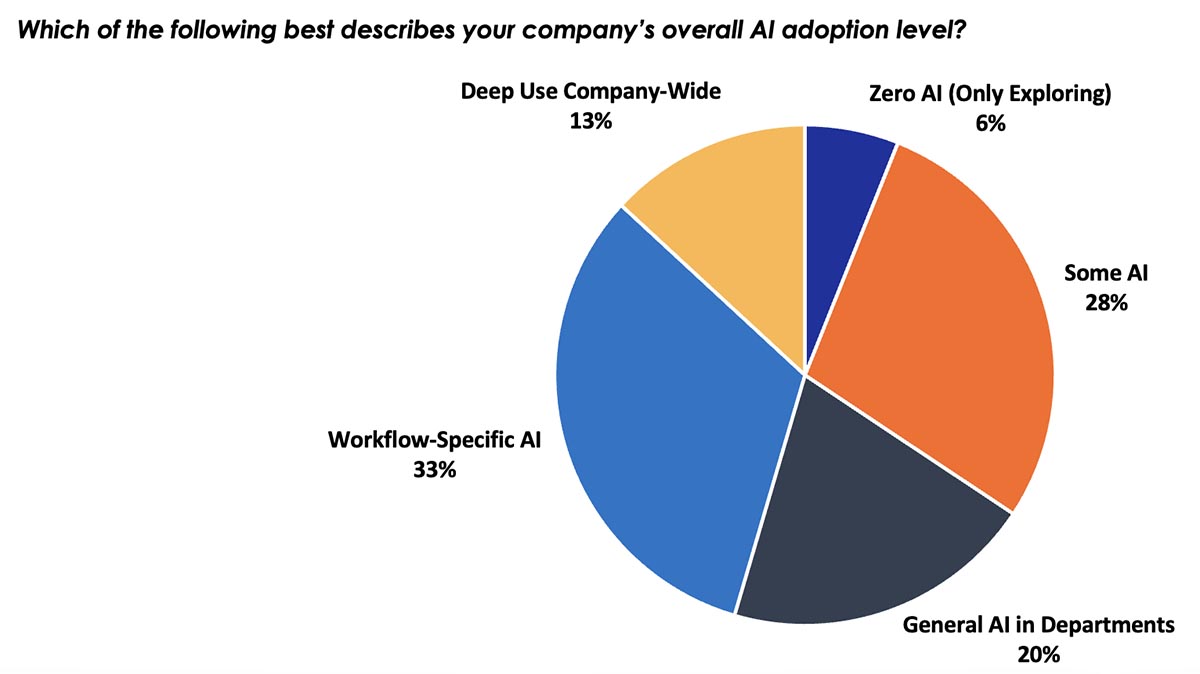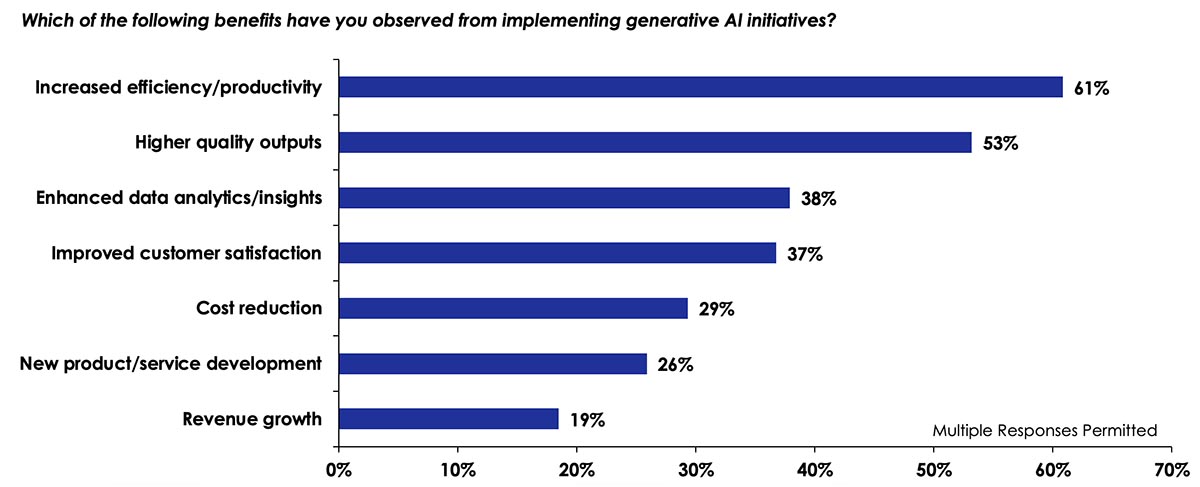- While AI adoption is certainly widespread, the depth of integration varies dramatically.
- AI technology has the potential to elevate the quality of human work, not just replace it.
- As AI becomes more deeply integrated into core business processes, fairness, transparency, and accountability will be crucial.
By Anne Valaitis
Introduction
For years now, we’ve been being told that the artificial intelligence (AI) revolution is upon us. Even so, the dust is settling after an initial wave of excitement—so what’s really happening in the trenches of business AI adoption? Keypoint Intelligence recently published an AI readiness survey of over 450 business leaders across various industries to help answer this question and others. This article provides some key observations from our survey data and paints a clearer picture of AI’s current impact and future potential.
AI is Here to Stay, but Integration Varies
There is no question that the AI phenomenon is upon us. According to our survey data, a whopping 94% of business respondents were using AI in some regard. Additionally, 13% reported deep use of AI on a company-wide basis.
Figure 1: AI Adoption Level

N = 454 Total Business Respondents
Source: The State of AI Readiness: A Comprehensive Benchmarking Analysis: Keypoint Intelligence 2024
At first glance, the chart above seems to validate the narrative of an AI revolution in full swing. If we dig a little deeper, though, a more complex story emerges. While adoption is certainly widespread, the depth of integration varies dramatically. Many companies are still in the early stages, with over a quarter of respondents (28%) only using some AI features in existing tools (e.g., Salesforce). This suggests that while AI has clearly gained a foothold in the business world, we’re far from the sci-fi vision of AI-driven enterprises that some vendors might have us believing in.
The reality is that most businesses are still grappling with how to meaningfully integrate AI into their operations. They’re exploring, experimenting, and slowly expanding their use cases, but most aren’t using AI deeply yet. This measured approach is actually a positive sign—it indicates that businesses are being thoughtful about AI adoption rather than rushing headlong into potentially risky or possibly ineffective implementations.
AI’s Impact Can Be Different than Expected
Keypoint Intelligence’s AI readiness survey reveals that AI is making a significant impact, but this impact does not always occur in the ways or places one might expect. When asked about the benefits of AI initiatives, 61% of respondents cited increased efficiency and productivity—which is not surprising. More interestingly, over half of participants reported higher quality outputs. This is a benefit that often gets overshadowed by discussions of cost-cutting and automation.
Figure 2: Top Benefits of Generative AI Initiatives

N = 454 Total Business Respondents
Source: The State of AI Readiness: A Comprehensive Benchmarking Analysis: Keypoint Intelligence 2024
This focus on quality improvement suggests that AI's impact goes beyond simply making processes faster or cheaper. It enhances the work being done, leading to better products, services, and decision-making. This crucial point often gets lost in the noise of AI hype—the technology has the potential to elevate the quality of human work, not just replace it.
Another unexpected finding was the impact of AI on cross-departmental collaboration. Over three-quarters of respondents (78%) to this same survey reported that AI technologies had significantly or moderately improved knowledge sharing and collaboration across departments. This hints at AI’s potential as a unifying force within organizations, breaking down silos and fostering a more integrated approach to business challenges.
Future Hurdles
As businesses move beyond initial experimentation with AI, new challenges are coming to the fore. Chief among these are ethical considerations and data quality issues. Our survey found that 53% of companies are currently developing policies to address ethical considerations and biases in AI, while 44% already have comprehensive policies in place.
This focus on ethics isn’t just about avoiding negative press or regulatory issues—it’s fundamental to building AI systems that can be trusted and relied on for critical business decisions. As AI becomes more deeply integrated into core business processes, fairness, transparency, and accountability will be crucial.
Equally important is the quality of data used to train AI models. When asked about their confidence in providing high-quality, relevant, and unbiased training data, 81% of respondents to our survey expressed a high degree of confidence (assigning a rating of 4 or 5 on a 5-point scale). Nevertheless, this high level of confidence may be misplaced given the well-documented challenges in sourcing and preparing AI-ready data.
The gap between perceived and actual data readiness could be the next major hurdle for AI adoption. As businesses push for more advanced AI applications, they may find that their data isn’t as clean, comprehensive, or unbiased as they once thought. Addressing these data quality issues will likely be a major focus for AI initiatives in the coming years.
The Bottom Line
Our survey paints a picture of AI adoption that’s less flashy than recent headlines might suggest, but potentially more transformative in the long run. We’re in the middle of a quiet revolution, where AI is steadily being woven into the very fabric of business operations. The challenge now is to move beyond the overexcitement and focus on the practical, ethical, and data-driven foundations that will enable AI to truly transform businesses. It’s not about adopting AI for its own sake, but about thoughtfully integrating it in ways that enhance human capabilities, improve quality, and drive meaningful business outcomes.
As we navigate this new landscape, the real AI revolution won’t be marked by flashy headlines or miraculous overnight transformations. Instead, it will be built on a foundation of careful implementation, ethical consideration, and high-quality data… one business process at a time.
For more information about Keypoint Intelligence’s primary research on the AI revolution, click here.
As Principal Analyst for Keypoint Intelligence’s AI Service, Anne Valaitis draws on her document management and artificial intelligence expertise to help clients identify opportunities where AI can streamline operations, reduce costs, and shape new offerings that drive market demand and generate revenue. She has led numerous research projects that have influenced the document solutions landscape.















Discussion
By Dave Hultin on Aug 22, 2024
Thank you, Anne, for sharing these insights on AI adoption. AI is indeed driving transformational experiences for many—I’ve experienced it firsthand after completing my own comprehensive AI training course!
You said:
>> The challenge now is to move beyond the overexcitement and focus on the practical, ethical, and data-driven foundations that will enable AI to truly transform businesses.
That is so true! The missing ingredient is often training. AI isn't just for parlor tricks; with the right training, it can drive measurable productivity gains in daily operations, moving beyond the initial excitement to achieve real, impactful work.